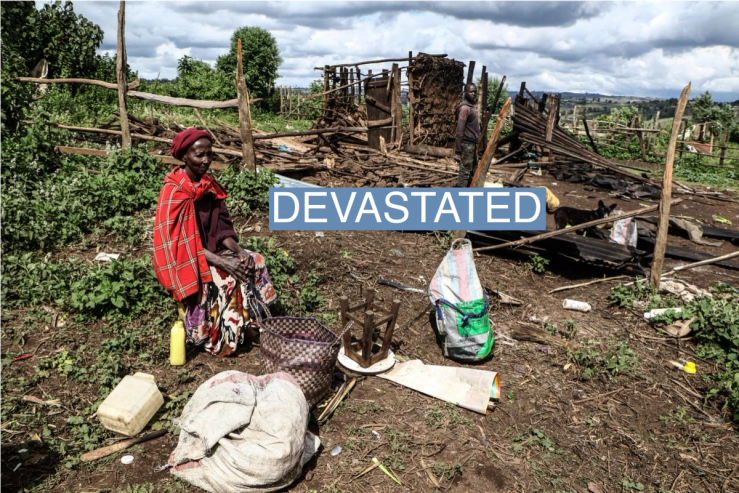The News
Multiple communities in Kenya are protesting against forceful evictions from their homes and disruption to their ways of life which they blame on a raft of government deals to ramp up the production and sale of carbon credits.
Members of Kenya’s indigenous Ogiek community in November faced eviction from their homes in Mau, the country’s largest forest. The government-led eviction saw their houses demolished and torched.
The Kenya National Commission on Human Rights (KNCHR) said the evictions took place “under unclear circumstances, without due process and without sufficient measures to mitigate the suffering of the affected persons.” The community’s lawyers now claim the evictions are linked to Kenya’s push to capitalize on carbon credits, which requires maintaining control over forests.
Leonard Mindore, founder of Ogiek community organization ProHOME, told Semafor Africa that many in the community, including himself, blamed carbon credit projects for the evictions. “The government comes in the name of (forest) conservation but I believe the eviction is influenced by carbon credits,” he said.
Carbon credits can be traded or purchased by companies to allow them to emit a certain amount of carbon dioxide or other greenhouse gasses. Carbon credits are generated by projects that reduce or remove emissions — such as forest conservation or renewable energy projects.
Members of the Borana pastoralist community living in northern Kenya blamed a carbon credits initiative used by Meta and Netflix, the Northern Kenya Grassland Carbon Project (NKGCP), for disrupting traditional grazing patterns, and called for the conservancy running it to vacate their ancestral land in March. They also stated that the carbon project lacked their prior consent.
The project seeks to lower emissions by managing grazing patterns to give vegetation more time to recover.
“We are pastoralists, we don’t want to be given restrictions that we can’t move with our animals,” said Abdullahi Hajji Gonjobe of the Borana community at a press conference.
Know More
Kenya’s government has inked several carbon credit deals with companies and intermediaries around the world as global organizations look to burnish their green credentials and the country works to boost earnings from carbon credits. In October, Kenya signed a deal with Dubai-based firm Blue Carbon conceding ‘millions of hectares’ for the production of carbon credits.
Meta and Netflix are among organizations that purchased tens of millions of dollars worth of carbon credits from the controversial NKGCP project. A Saudi Arabian firm purchased 2.2 million tonnes of carbon credits in an auction in Kenya in June in what was described as the world’s largest transaction of its kind.
President William Ruto wants to increase Kenya’s production of carbon credits to 30 million tonnes of CO2-equivalent annually, and has described Africa’s carbon sinks as an “economic goldmine” that could boost economies and create jobs. In September, he signed into law an act regulating Kenya’s carbon markets. The law requires carbon projects to sign profit-sharing agreements with local communities. They are obligated to share 40% of profits with local communities for projects on land.
Martin’s view
Without the proper safeguards, the race to capitalize on carbon credits could potentially put communities in Africa at risk of human rights abuses.
Educating local communities on carbon credit schemes, securing their consent for projects and partnering with them to ensure they realize the benefits will be key to the success of carbon projects in countries such as Kenya. Partnering with communities will also help minimize disruption to their everyday lives.
Lempaa Suiyanka, a human rights lawyer with Nairobi-based Katiba Institute, said that unless governments and organizations educate communities on carbon projects and secure their support, there would likely be further conflicts involving communities and authorities, as well as human rights abuses.
“The occupants of the land must be told why that carbon credit is useful to sustainable development and environmental conservation,” he said. “Any development that is not fully explained to the people so that they can embrace it is likely to come up with a lot of violations of rights and freedoms.”
Observing that the challenges were not entirely new, he highlighted evictions of Kenya’s Sengwer community from the Embobut forest by the government in 2014, which were linked to a World Bank-funded carbon offset project.
Strong legal frameworks are also required to ensure communities are protected from harm in carbon projects.
Room for Disagreement
Mikoko Pamoja is a project helping to conserve 117 hectares of mangroves on the Kenyan coast. It was validated to sell at least 3,000 metric tons of CO2 equivalent per year — enabling it to generate annual revenues of about $130,000. According to a United Nations report, revenues from the project have so far helped fund schools, hospitals and water pumps providing clean drinking water for children in local primary schools and nearly 5,400 people in the wider community.
The View From Gabon
Last December, officials from Gabon, the world’s most forested nation, told Semafor Africa that they would issue 90 million carbon credits for between $25 to $30 per credit. According to officials, the move would help develop Gabon’s economy while contributing to environmental preservation. But an investigation by conservation NGO Rainforest Foundation UK in March, found that the carbon credits issued by Gabon were likely “worthless.”
The investigation questioned the methodology used to calculate the emission reductions and carbon credits, highlighting potential manipulation of figures. Gabon relied heavily on ‘prevented deforestation’ and tree planting numbers to calculate emission reduction.
Notable
- Semafor’s Tim McDonnell in September explored the potential of carbon markets to help African countries raise the billions of dollars needed to adapt to the impact of climate change.
- Concerns over the credibility of carbon markets in Africa could affect green energy companies that have carbon credits at the heart of their business models, writes David Piling for the Financial Times.


